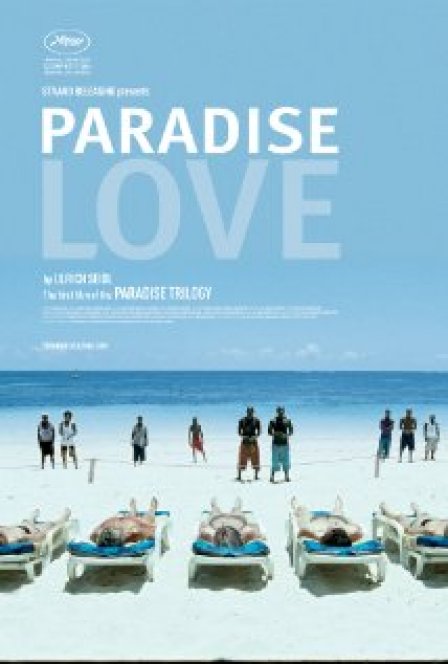The first of a triptych of films from Austrian director Ulrich Seidl about three women from the same family who each undergo an emotionally trying, largely physical journey towards recognizing some dispiriting aspect of themselves, Paradise: Love is about a fifty-year-old, overweight, middle class Austrian woman on a fairly unpleasant vacation to Kenya. That’s not intended to be mean: those descriptors are front-and-center among the movie’s ideas. The fact that the woman is overweight and fifty is essential to the story, and Seidl uses a good chunk of his narrative time proving his willingness to show every wrinkle and fold of flab on his protagonist’s body.
Her name is Teresa (Margarete Tiesel), and, because of a number of dutiful habits she’s shown engaging in, like keeping her teenage daughter on time for appointments and cleaning her hotel bathroom, she seems like a perfectly pleasant person (though Seidl doesn’t seem too interested in coming forward with information or insight that might give us a deeper understanding of who she is). Quickly growing bored lounging around the bar and pool of the Kenyan resort she’s checked into, Teresa wanders off the reservation into the aggressive world of young Kenyan men who make their living hocking wares to European tourists. She finds that she can’t take a walk down a beach without roughly a dozen of them thrusting jewelry in her face, and when she finally acquiesces to buy a few necklaces for her daughter, she finds that cheap trinkets are just the tip of the iceberg of what the young men are selling.
The majority of the movie’s time is taken up with following Teresa from the tiny apartment of one Kenyan man to the tiny apartment of the next, as she allows them to sell her first jewelry, then sex (rendered impassively and raw by Seidl). Finally,they sell her any one of a stock supply of bleeding heart stories, invariably involving some tragically ill family member, intended to squeeze out of her every bill of cash she’s got.
Paradise: Love is about the sad clash of basic human needs. On the one hand, the film shows audiences a lonely, aging, and well-intentioned European lady who’s done nothing worse than indulge a desire to see the beauties of Africa from a safe vantage point (though if you consider one of the beauties of Africa to be the bodies of its young men, then her vantage point becomes progressively more dangerous as the film goes on.) On the other, we see a mass of poor Kenyans who don’t have any recourse for making a living beyond duping women like Teresa who, after all, have come to Kenya of their own free will to spend money and have a good time. The way the men use Teresa in order to con her out of money doesn’t come off as malicious, or even particularly damaging. In Seidl’s view, it’s simply a way to make a living in a country without a whole lot of other prospects for upward mobility.
The director’s not interested in condemning Teresa for being a daft European tourist, either; he views her sad vacation days with a realistic, tender eye, and has no less sympathy for the way she objectifies African men for their dicks and muscular bodies than for the way they see her as little more than a way to make money for their families. The whole thing is a downer, naturally, constructed that way to its core, though very professionally shot and acted. Its brightest part, intentional though hardly overwhelming, is the way Seidl consistently and rawly captures modern Africa in an undeniably believable way. Although, for a film that shows how mundane and miserable the supposedly exotic life there can be, that’s not a terribly cheering ray of light.

